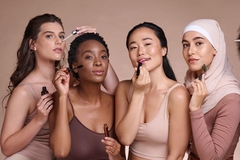Popular South Asian ingredient fenugreek shows skin care potential in lab tests

Fenugreek, a common ingredient in South Asian and North African cuisine, has been identified for its active compound potential and is a promising candidate as a skin care ingredient, according to new research in the journal Cosmetics.
Scientists from Tunisia and France have highlighted the initial promise of fenugreek extract as a skin care active, saying that lab tests show antioxidant and antimicrobial properties. The study also showed that a fenugreek cosmetic cream passed an initial shelf stability test, passing another key cosmetic criteria for the ingredient.
“These findings align with previous studies on the stability of plant-based cosmetic formulations and highlight the potential of fenugreek extract as a safe, effective, and sustainable ingredient for next-generation skin care products,” say the study’s authors.

Fenugreek seeds (Trigonella foenum-graecum) are an herb that is native to western Asian, Mediterranean, and southern European regions and is frequently found in food spice blends. Fenugreek oil is also a nutritional supplement that supports people managing diabetes, menstrual cramps and is taken to support breast milk production.
Previous research has highlighted fenugreek’s antioxidant activity, which prompted the latest research to examine the herb for use in skin care applications. Oxidative stress on the skin can cause skin pigmentation and aging. As a result, cosmetics research is focused on identifying botanical ingredients that have naturally occurring antioxidant properties. https://www.sciencedirect.com/science/article/pii/S1658077X15301065
Popular properties
To study fenugreek for skin care, the researchers used an extraction method to maximize the amount of antioxidants pulled from the fenugreek seeds, called the ultrasound-assisted extraction process. This technique uses high-frequency sound waves to extract bioactive compounds from bio-material, such as plants and microorganisms. This process produces a higher yield of bioactive compounds and uses less solvent in the process.
The researchers measured the total antioxidant capacity of the extract and tested its ability to neutralize free radicals and ferric reducing power. These are widely used methods to determine a compound’s antioxidizing ability.
The test results indicate the extract had high phenolic compounds, molecules in plants that fight oxidative stress. The overall outcome suggests that fenugreek is comparable to known antioxidants green tea and rosemary, say the researchers.
“The combination of high phenolic content and antioxidant activity positions fenugreek extract as a promising candidate for cosmetic applications, particularly in anti-aging and skin-rejuvenating products,” say the study authors.
The fenugreek extract was also tested for antibacterial properties, putting it against four disease-causing bacteria strains in petri dishes. The researchers said the results indicate the extract had “broad-spectrum antibacterial activity” as it prevented all bacteria strains from growing. The higher the concentration of the fenugreek extract, the better it was at stopping bacterial growth.
Finally, a cosmetic cream made with the fenugreek extract was tested for shelf stability, a key feature for a potential cosmetic ingredient. The researchers subjected the cream to different storage temperatures for 90 days, one at 40 degrees Fahrenheit (4 degrees Celsius), another at 77 degrees Fahrenheit (25 degrees Celsius), and a third at 104 degrees Fahrenheit (40 degrees Celsius). The results showed the creams remained stable across the three months.
“The cosmetic cream containing fenugreek eco-extract demonstrated excellent stability over 90 days, maintaining its physical properties, color, and consistency under various storage conditions,” say the authors.
The researchers emphasize that the study is the first step in identifying whether fenugreek extract is a worthy candidate for skin care applications. Still, the results indicate it has promising active properties that are worth exploring further.
Rising star ingredients
Companies looking to innovate products are seeking novel and effective skin care ingredients, often turning to bio-based sources. One such ingredient that is on the rise is ectoin, a protective compound that is found in extremophiles, the microorganisms that thrive in extreme environments. The ingredient has been found to be a star repair agent that acts against inflammation and aging, or “inflammaging.”
Personal Care Insights spoke to the German biotech company manufacturing ection, Bitop AG, about its broad applications and why it is an increasingly sought out ingredient for personal care formulations.
Similarly, a recent study highlighted natural compounds from a rare Japanese algae may have anti-aging benefits as a nutritional supplement or topical use. The research focused on saclipins, compounds that are produced when the algae is responding to environmental stress. In lab tests, researchers found saclipins to have strong antioxidizing properties.













